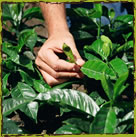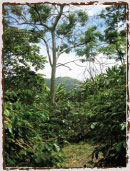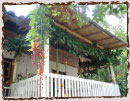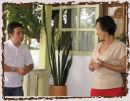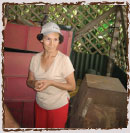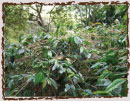Doña Marlene's Finca…
About 1500 meters (4920 feet) up a Colombian mountain in the municipality of Cordoba, in the state of Quindio, lies a coffee finca (farm) of 7 hectares (17.30 acres) belonging to the lovely and gracious Doña Marlene Castaño. This beautiful farm, “La Arboleda” (The Woods) has been in Doña Marlene's family for 150 years and she tends it like the cherished heirloom that it is. “I am just a little woman with a little farm, but I have a huge heart” she tells us. And this is never more evident than in the fact that she has taken the time and effort to have her farm certified by Rainforest Alliance. This certification program is no easy feat, as one must comply with 10 stringent principles:
- Environmental and social management system
- Ecosystem conservation
- Wildlife protection
- Conservation of water resources
- Good working conditions
- Occupational health and safety
- Good relationships with communities
- Integral management of crops
- Soil management and conservation
- Integral management of waste
Almost all of these principles and their requirements were already met by Doña Marlene before she sought certification. For example, the wages that she pays her coffee pickers were already far above the standard wage of the region. When asked why, she informed us that it was simple: she produces specialty coffee that commands a high price in the marketplace. Her pickers are trained to pick only ripe coffee cherries, no green cherries or other defects, and thus this quality picking demands more skill and time, which in turn pays a higher rate for each “carga” (20 kilograms of coffee cherries) that are harvested. But Doña Marlene was quick to point out that “Mother Nature is the hardest worker on my farm!”
The only change she had to make in order to become Rainforest Alliance Certified was in water waste management. It used to take 40 liters of water per kilo of finished wet coffee beans to wash her coffee and now it takes only 1 liter. This change from a traditional method of washing coffee to a newer (mucilagenizacion) method may have been a costly one (she paid about $3,000 for the machinery), but it is one she does not regret.
As far as being Certified Organic, she laughed and said, “Look around you. By nature this farm is organic. I have everything organic—good rich soil, shade trees, rain and healthy coffee plants!” Hiking even higher into her coffee farm, accompanied by her Golden Labrador Retrievers, Doña Marlene proudly shows us some of her 50 year old (!) coffee “typica” plants. Agronomists tell her that these old trees should be torn out for new varieties that produce more coffee and are less susceptible to insects and disease. It is obvious, though—Doña Marlene could no sooner tear out these trees than she would tear off one of her arms… They are clearly part of her, of her farm and of her heritage. The view is breathtaking. The birds are singing, the sun is shining and we can easily understand the very strong bonds that tie this woman to her precious finca, La Arboleda.
